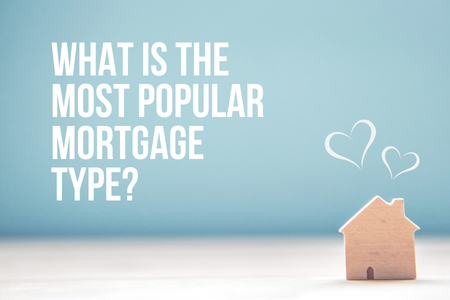Welcome To Our Mortgage Educational Blog About:
What is the most popular mortgage type?

Canadians, and Edmontonians, are obsessed with real estate. And why shouldn’t we be? Our country boasts one of the hottest housing markets in the western world. While you may think you know everything there is to know about mortgages in Canada, you’d be wrong. So, that’s why we are going to talk about the most popular mortgage.
Many little-known facts can help potential home buyers make a good or bad decision when applying for a mortgage. So, whether you’re looking to shop around different lenders or want to hone your financial skills before entering the home buying scene, continue reading below for some valuable tips on this subject matter.
What is the most popular mortgage?
The answer is simple: the five-year fixed rate. This might be surprising, given that 5-year fixed rates tend to have a slightly higher interest rate than other mortgages. Why would more Canadians choose these more expensive loans? We’ll get into that below.
However, the popularity of 5-year fixed-rate mortgages has grown substantially since the beginning of 2019. Fixed-term mortgages became available at similar or even lower rates than their variable-term counterparts during that year.
According to a recent report, in 2020, 72% of Canadians had a fixed rate, 18% were variable rate, and 5% were a combination of the two.
What is a fixed-rate mortgage?
Most of us are familiar with variable-rate mortgages, which adjust their interest rates based on a floating rate. The fixed-rate mortgage lets homeowners pay an unchanging amount each month for up to 25 years.
That doesn’t mean this popular mortgage doesn’t come with any risks. If interest rates drop, you could find yourself paying more than if you had opted for a variable-rate mortgage. For more information on these mortgages, visit our Edmonton mortgage providers page today and contact us for a consultation.
Why is it the most popular mortgage service?
Many homebuyers choose a fixed-rate mortgage because they are concerned about how rising interest rates could affect their finances. That is, if your payments don’t increase when interest rates rise, you might be tempted to spend more.
On top of that, you’ll get peace of mind knowing exactly how much you have to pay each month for your loan—no surprises! This is especially true for borrowers who want predictability or tend to hold the property for the long term.
Also, these mortgages are slightly more common for the youngest age groups, and older age groups are more likely to choose variable-rate mortgages. Moreover, recently, Canadians have enjoyed access to some of the best-fixed rates available in decades.
How to calculate the costs of a fixed-rate mortgage
Before you choose a fixed-rate loan, calculate how much your monthly payments will be with your lender of choice. To do so, determine an amortization period (the period it takes to pay off your mortgage) and add additional interest costs.
It’s also worth knowing that some lenders require a minimum 20% down payment on their fixed-rate mortgages. For more accurate information, you can also use these online mortgage calculators.
The pros and cons of the most popular mortgage in Edmonton
What are the pros of the most common mortgage type in Canada, and Edmonton?
The length and interest rate on a five-year fixed rate is locked in for up to five years. As mentioned above, this means there is less risk for homeowners if interest rates go up (they likely will) or down (they probably won’t) like this housing report for Edmonton shows.
You also get competitive rates since mortgage providers love them. Lenders often get the most aggressive when pricing these terms because it’s such a competitive, popular rate term.
Fixed rates also let you budget better by knowing exactly how much your mortgage payments will be each month until your term expires.
What are the cons of the five-year fixed-rate mortgage?
A major disadvantage of a fixed-rate popular mortgage is that your monthly payment stays constant no matter how long it takes you to pay off your loan — which can be difficult if you’re saving for something like a child’s education or retirement.
The only way out with a fixed-rate mortgage is to refinance with another mortgage provider. The downside is that if you can’t afford your monthly payments over a long period of time, you could end up paying more interest in total than someone who has gone with a shorter-term option.
In the event of getting sick or losing your job, or even divorcing, you can get penalties if you want to break your mortgage. And let us tell you this – you won’t like the penalties at all since it can get pretty expensive.
Is the 5-year fixed-rate mortgage term right for you?
A 5-year fixed rate can save you big money over a variable rate, but only if it makes sense for your financial situation. Knowing your options and doing some math before taking out a home loan is crucial.
Ask yourself these questions:
- Do I have any plans to move in the next five years?
- Will I need cash flow in future years?
- What will interest rates be by then?
It may sound obvious, but first, make sure you can actually afford a 5-year fixed mortgage; after all, it’s one of Canada’s most popular mortgages for a reason. You don’t want to fall behind on payments because you stretched yourself too thin.
If you think you’ll be selling or refinancing your home in five years, then it might make sense to lock into a rate now; if not, it may be better to look at other options (like a shorter-term with an adjustable-rate).
Since mortgages are complex products with lots of fine print, we’d advise contacting mortgage providers before making a final decision. Your mortgage provider should be able to tell you more about today’s interest rates and help you pick out a product that works best for your needs.
Get professional help from a mortgage broker in Edmonton!
At Merto Mortgage Group, we know that taking out a mortgage loan is a big decision. Think of us as your guides through all of Canada’s and Edmonton’s top lending institutions and products. You will have access to rates from many providers, including banks, credit unions and trust companies.
We will make sure you have a clear understanding of all your options—and let you make an informed decision about which lending institution best suits your needs based on costs, benefits and conditions.
If you need more information about the topic or any other questions about home buying mortgages, don’t hesitate to contact us.
Are you ready to apply for a mortgage? Reach out to me directly or start your application here: www.sandraforscutt.ca/mortgage-application/
Recent Educational Blogs
Preparing for Renewal Season
Oct 2025 | Preparing for Renewal Season: What 2026 Borrowers Should Do NowWith nearly 60% of Canadian homeowners set to renew their mortgages by the end of 2026, preparation has never been more important. After years of ultra-low rates during the pandemic, many...
Navigating Mortgage Renewals
Sept 2025 | Navigating Mortgage RenewalsFrom Rock-Bottom Rates to Today’s RealityIf you were lucky enough to secure a mortgage in the early days of 2020, chances are your rate was impressively low, often near 1% to 2%. At the time, the Bank of Canada’s overnight rate...
How Your Credit Score Impacts Mortgage Approval
Aug 2025 | How Your Credit Score Impacts Mortgage Approval If you’re thinking about buying a home, you might be wondering how your credit score influences the process. The short answer: your credit score is one of the most important factors lenders consider when...



